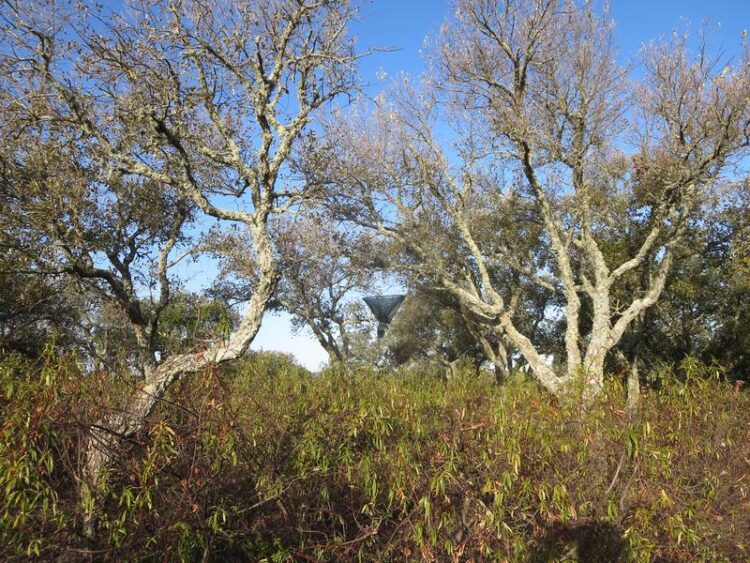Invasive gum rockrose threatens cork oaks in Portugal

Cork oaks among gum rockroses in Portugal.
Bild: Simon Haberstroh / University of Freiburg
- Team led by Simon Haberstroh demonstrates that cork oaks under gum rockrose invasion change their water use strategy during drought, thereby consuming less water
- The modified strategy causes the cork oak to take up less carbon, resulting in reduced growth
- Haberstroh: “Until now, we were not aware that competition for water between plants can lead to such a change in water use strategy”
What strategies and adaptive measures does the cork oak (Quercus suber) use in savanna-like ecosystems in southeastern Portugal to meet its water needs in summer and winter? And how does it perform when this tree competes for water with the invasive gum rockrose (Cistus ladanifer)? A team led by Dr. Simon Haberstroh and Prof. Dr. Christiane Werner from the Institute of Earth and Environmental Sciences at the University of Freiburg describe their findings on these research questions in the journal Functional Ecology.
Cork oaks change their water use strategy
According to the scientists, neither cork oaks nor gum rockroses control their water flows much in winter or spring. However, this changes during the summer drought, when cork oaks limit their water losses to withstand drought conditions. In contrast, rockrose, an invasive shrub, uses available soil water resources. “This competitive strategy of the shrubs led to a change in the hydraulic behavior of the cork oaks. Previously, we were not aware that competition for water between plants could lead to such a change in water use strategy,” Haberstroh explains. “As a result, the cork oaks took up less carbon, which was expressed by restricted tree water flow, reduced leaf area and stem growth. With continued and recurrent drought stress, this behavior will most likely have long-term negative effects and could contribute to the already observed decline of cork oaks.”
The team studied the plants between October 2017 and March 2020 in Portugal. In the field, the researchers documented data on weather, groundwater content, leaf area and sap flow, among other things.
Overview of the facts:
• Original publication: Haberstroh, S., Lobo-do-Vale, R., Caldeira, M. C., Dubbert, M., Cuntz, M., Werner, C. (2022): Plant invasion modifies isohydricity in Mediterranean tree species. In: Functional Ecology. DOI: 10.1111/1365-2435.14126
• Simon Haberstroh is lecturer at the Chair of Ecosystem Physiology
• Haberstroh’s research focuses on the following topics in particular: Adaptation of plants to drought, plant-plant interactions, plant invasion, ecosystem functioning, plant recovery and resilience.
Wissenschaftliche Ansprechpartner:
Dr. Simon Haberstroh
Institute of Earth and Environmental Sciences
University of Freiburg
Tel.: 0761/203-8303
E-Mail: simon.haberstroh@cep.uni-freiburg.de
Originalpublikation:
Functional Ecology. DOI: 10.1111/1365-2435.14126
Weitere Informationen:
https://kommunikation.uni-freiburg.de/pm-en/press-releases-2022/invasive-gum-roc…
Media Contact
All latest news from the category: Ecology, The Environment and Conservation
This complex theme deals primarily with interactions between organisms and the environmental factors that impact them, but to a greater extent between individual inanimate environmental factors.
innovations-report offers informative reports and articles on topics such as climate protection, landscape conservation, ecological systems, wildlife and nature parks and ecosystem efficiency and balance.
Newest articles

Sea slugs inspire highly stretchable biomedical sensor
USC Viterbi School of Engineering researcher Hangbo Zhao presents findings on highly stretchable and customizable microneedles for application in fields including neuroscience, tissue engineering, and wearable bioelectronics. The revolution in…

Twisting and binding matter waves with photons in a cavity
Precisely measuring the energy states of individual atoms has been a historical challenge for physicists due to atomic recoil. When an atom interacts with a photon, the atom “recoils” in…

Nanotubes, nanoparticles, and antibodies detect tiny amounts of fentanyl
New sensor is six orders of magnitude more sensitive than the next best thing. A research team at Pitt led by Alexander Star, a chemistry professor in the Kenneth P. Dietrich…





















